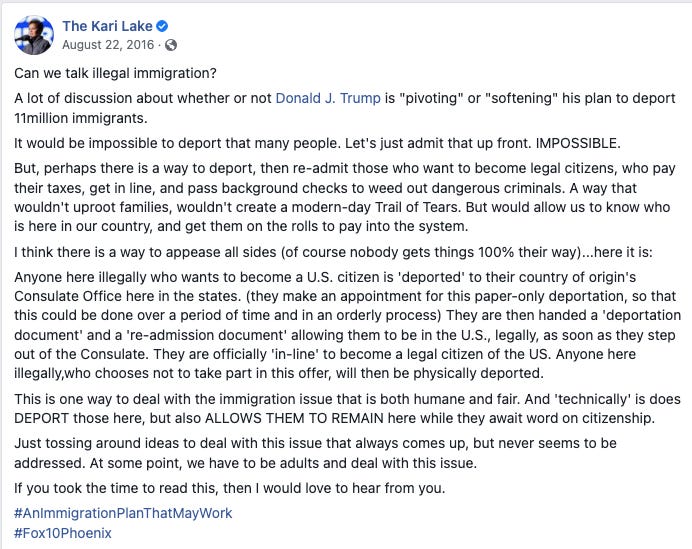The Daily Agenda: A banner day for lawsuits
We're all going to pay for these court cases ... The emergency is over for now ... And a Facebook post from the Kari Lake vault.
Gov. Doug Ducey signed four bills on Wednesday that will all likely end up in court.
And that’s probably the point. The four bills — one on abortion, two on transgender children and one about election law — all threw up red flags with the Legislature’s constitutional attorneys. But they could find a friendlier court after Trump appointed Republican judges up and down the legal system during his time in office.
The American Civil Liberties Union already said it would sue over the bill banning gender reassignment surgeries for people under age 18. The election bill lawmakers passed is a rehash of a 2004 law that the U.S. Supreme Court struck down, and it will almost certainly face a legal challenge. The trans kids sports bill mirrors laws in other states that have faced lawsuits and not fared well thus far. And the anti-abortion law is clearly unconstitutional — unless the U.S. Supreme Court changes its mind.
SB1164, sponsored by Arizona Sen. Nancy Barto, prohibits abortions after 15 weeks of gestation, unless there’s a medical emergency. Doctors are required to file reports with the state if an abortion is peformed after 15 weeks. And if a doctor intentionally performs an abortion outside this law, they can be charged with a felony and lose their license. People who get an abortion after 15 weeks would not be prosecuted. In his signing letter, Ducey pointed to a lawsuit over a Mississippi anti-abortion law that is nearly the same as the one he signed; that case, Dobbs v. Jackson Women’s Health, is now pending before the U.S. Supreme Court.
In signing HB2492 from Republican Rep. (and banned-from-Twitter troll farmer) Jake Hoffman, Ducey invoked the will of voters back in 2004 to require proof of citizenship to register to vote. But he didn’t explain the constitutional history of that year’s Proposition 200, which was a softer version of HB2492. The U.S. Supreme Court struck down that 2004 law, which also required proof of citizenship beyond what was outlined in the National Voter Registration Act, saying Prop 200 would allow Arizona to reject voters who had satisfied the federal requirements to vote. In court, a lawsuit against this bill could face a different outcome as it heads to a much more conservative court than the one that eventually struck down Prop 200 in 2013.


Arizona Sen. Warren Petersen’s SB1138 makes it illegal for doctors to perform “irreversible gender reassignment surgery” on anyone under age 18. The law provides a list of acceptable treatments that doctors can provide to minors, including services for sexual development disorders. The law defines what these prohibited surgeries are, and it defines biological sex, gender and gender transition. As originally introduced, the bill would’ve banned the use of hormones and blockers in gender-affirming care, but those measures were amended out. In his signing letter, Ducey said these decisions on irreversible surgeries should be made in adulthood.

Republican Sen. Nancy Barto’s SB1165 bars trans girls from participating on “girls” sports teams in Arizona schools. It’s part of a wave of anti-trans bills working their way through state legislatures (and now the courts). Mirror laws in other states haven’t fared well in court thus far: West Virginia's law has been paused by a federal district court judge as the legal arguments continue, and Idaho’s law was also struck down by a federal district court judge, while the ongoing appeals were complicated by the fact that the athlete who sued no longer attended the school. Only 16 trans athletes have played high school sports on teams that align with their gender identity in Arizona since 2017 (including trans boys, who would not be affected by the law), the Associated Press reports. Utah’s Republican Governor Spencer Cox last week vetoed a similar law, though the state Legislature there quickly voted to override his veto.
The road to being officially upheld or declared unconstitutional is a long one. It will likely be several years (and hundreds of thousands of dollars, if not millions, in legal costs) before we have a definite answer to whether these bills pass legal muster.
By then, Ducey will be long gone from the governor’s office, and many of the lawmakers who voted for it will likely be out of office, too. But we’ll still be here, paying the legal fees for politicians to test the boundaries of the law.
When we say we’ll be here, we mean us taxpayers — not necessarily the Arizona Agenda. Whether this newsletter survives or dies is up to you, dear reader. If you want us to stay in business, become a paying subscriber today.
Emergency is over, COVID-19 is not: Gov. Doug Ducey ended Arizona’s state of emergency after more than two years, as did Maricopa County. The state of emergency allowed for more on-the-fly policy changes and declarations to track and manage COVID-19. For Ducey, a law that granted temporary licenses for public health workers proved crucial to ending the emergency, the Republic’s Stacey Barchenger reports.
Lawmakers get bold when they’re retiring: Arizona Sen. Paul Boyer, a Republican who will leave office at the end of the year, issued an education funding ultimatum in the Republic’s op-ed pages yesterday. He said he won’t vote in favor of another tax cut to avoid a ballot referral unless the Legislature and governor agree to put $900 million into education to respect the will of the voters after the majority of them approved a tax increase to fund education.

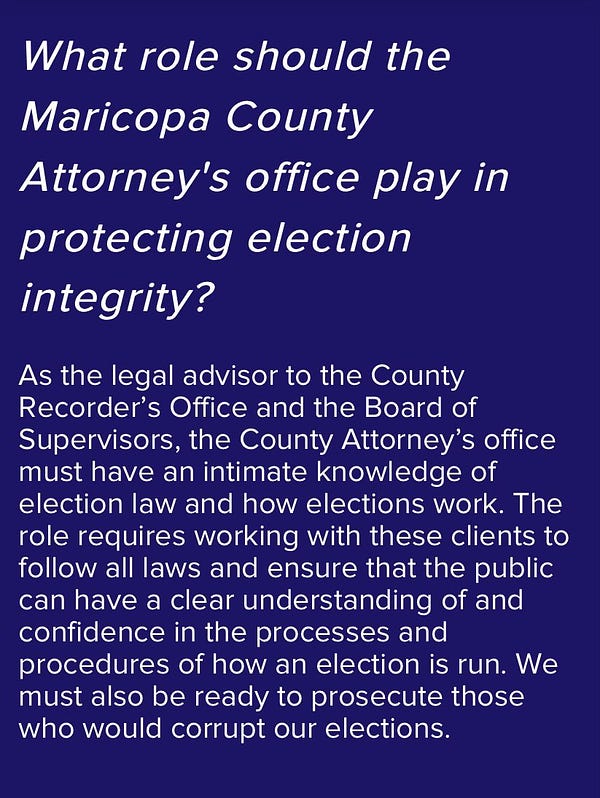
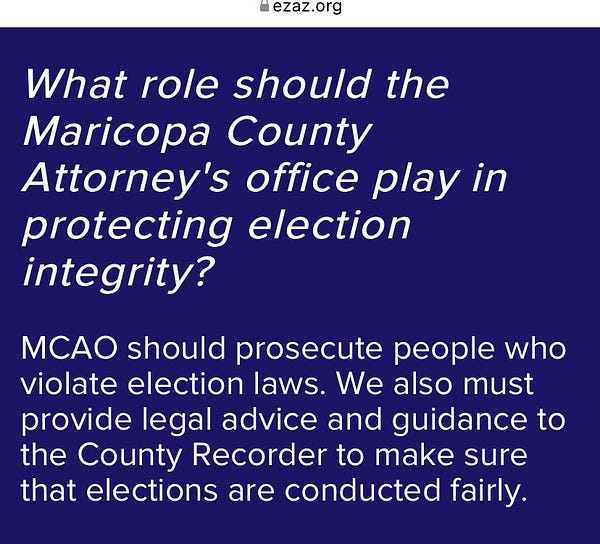
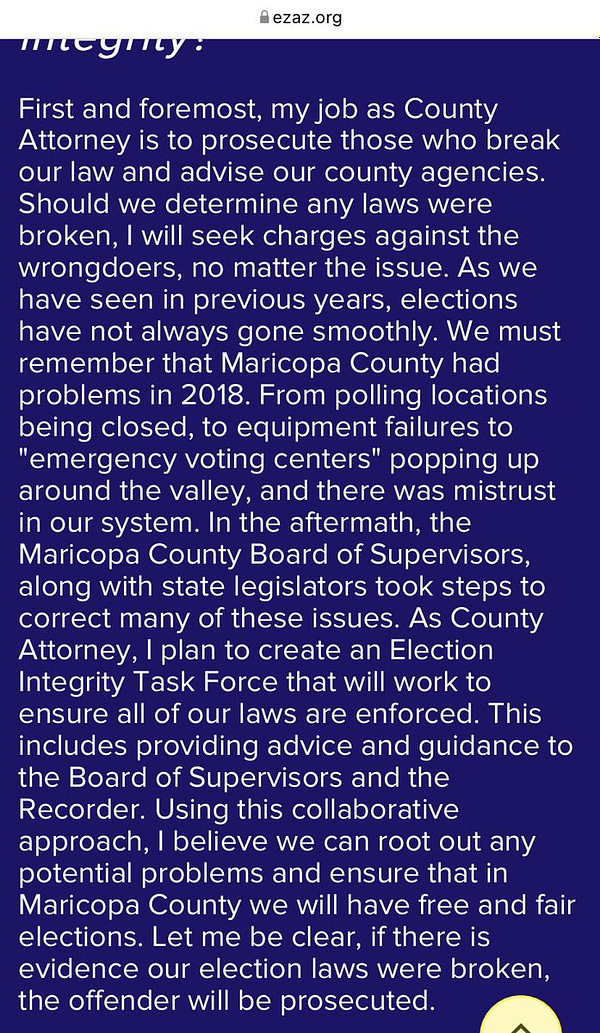
Just don’t do it again: Lawmakers asked the Auditor General’s Office to investigate the Secretary of State’s Office, Pima County and Maricopa County for their use of private grants to fund 2020 election duties and to investigate whether Maricopa County followed procurement codes in buying Dominion voting machines. The Auditor General’s Office responded yesterday with a 71-page report that breaks down the spending and says, basically, everything was done within the law.
They’re still beefin’: Attorney General Mark Brnovich wants Cochise County Attorney Brian McIntyre to investigate whether Secretary of State Katie Hobbs’ management of the E-Qual system has broken any laws, Capitol Media Services’ Howie Fischer reports. The move is the latest in an ongoing battle over Hobbs’ decision to temporarily shut down part of the system to update it after redistricting — and it’s the latest in an ongoing beef between Hobbs and Brnovich over virtually everything.
Accounting is hard: Probable Q of QAnon and current Congressional District 2 candidate Ron Watkins initially failed to report more than $20,000 in campaign funds, which he then reported in an amended filing, the Arizona Mirror’s Jerod MacDonald-Evoy reports. The Federal Election Commission wants an answer from Watkins about how he missed the funds the first time.
Put it on Karen’s tab: The tally for legal fees for the Arizona Senate’s audit-related records lawsuits is nearing $500,000, and auditors still haven’t turned over all the records to the media or watchdog groups that requested them.
You’re not seeing things: If you’ve been seeing more Waymo cars in downtown Phoenix, that’s because the company was testing the roads in the area and will launch a passenger ride service downtown similar to the one it offers in the Chandler area, the Republic’s Ryan Randazzo reports. The Phoenix program will start just with Waymo workers, and while the cars are self-driving, they will have drivers in them still.
Interrupting the tenuous agreement: The Arizona Coyotes will move from their Glendale arena to Tempe, but they want to keep their gambling operation intact, which would require a change to state law because the Tempe arena size isn’t large enough to allow a mobile sportsbook, the Associated Press’ Bob Christie reports. The gaming compact approved in 2021 that allowed for sports betting was negotiated among the state, numerous tribes, attorneys and sports teams.

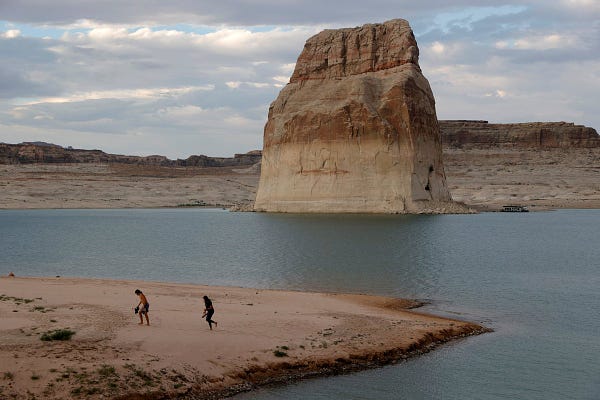
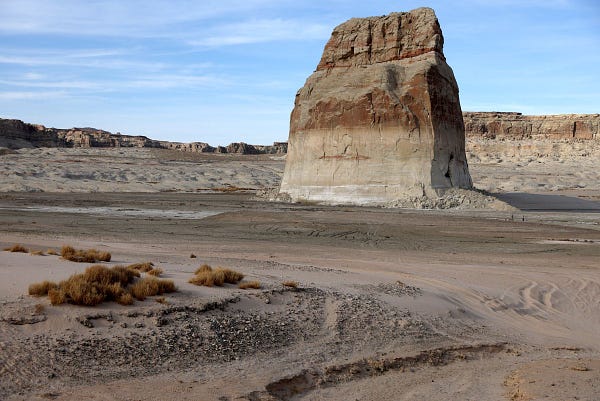
Another day, another set of lawsuits: An Arizona death-row inmate’s case will be heard at the U.S. Supreme Court, Cronkite News’ Reagan Priest reports. John Montenegro Cruz claims he was unlawfully denied the right to tell a jury that if he received a life sentence, he would be ineligible for parole. The high court acknowledged that inmates have this right in a 2016 decision, which Cruz argues should make him eligible for a new hearing. In other legal news, Arizona joined a lawsuit against the Biden administration over the federal mask mandate on public transportation.
An unfortunate backslide: After years of gains, Latino student enrollment at community colleges and Northern Arizona University decreased during the pandemic, though Arizona State University and University of Arizona saw increases in Latino student enrollment during the same timeframe, Republic reporter Daniel Gonzalez writes.
New name, old problem: Students who attended the former Ashford University, now an offshoot of the UA called University of Arizona Global Campus, told Phoenix New Times’ Elias Weiss that the rebranded college won’t help resolve the problems they had at Ashford.
Art and commerce: A health center in Cochise County serves patients from both Arizona and Sonora, a recognition that the Douglas and Agua Prieta communities often move across the border, as do infectious diseases, the El Paso Times’ Martha Pskowski reports. Elsewhere in the borderlands, people barred from asylum in the U.S. make traditional art as they wait for help, KJZZ’s Kendal Blust writes.
Weed can’t grow everywhere: In anticipation of the state’s marijuana social equity license lottery drawing, the City of Tucson initiated the process of setting up zoning rules for new social equity dispensaries, the Arizona Daily Star’s Nicole Ludden reports.
Everyone should carry Narcan: Fire stations in Nogales will now carry naloxone that community members can come pick up free of charge, the Nogales International’s Angela Gervasi reports. Naloxone can reverse an opioid overdose, and its accessibility is especially important as overdoses increase across the state in the past couple years.
We actually did have questions about javelinas: And those questions are now answered, thankfully. (They’re not pigs, they kinda stink and you should leave them alone.)
A bill from Fountain Hills Republican Rep. John Kavanagh would create an online database of mugshots and information about undocumented immigrants who commit crimes in Arizona.
House Bill 2326, which awaits a vote from the full Senate, calls on the Arizona Criminal Justice Commission to set up the website and would require courts to report to it with information about the undocumented person’s crime, name, photo, date of conviction, height and weight.
Opponents of the bill say it stokes fear of immigrants and encourages racial profiling, the Republic’s Javier Arce reports. Kavanagh told Arce the point of the bill was to “let people see how much crime (undocumented) immigrants are committing.”
We went this whole week without using the bottom of our email to make fun of Kari Lake — and to celebrate that achievement, we’re making fun of Kari Lake.
Not that her basic lack of knowledge of how government works, or her brand new fondness of guns, or her history of supporting President Barack Obama and other Democrats seem to bother her base of loyal supporters — as long as she smashes TVs and calls reporters names, she’s gonna be the frontrunner!
But here’s a Lake throwback that makes us smile: Lake’s 2016 plan for “paper-only deportations” in which nobody actually leaves the country and everyone is on a path to citizenship.







